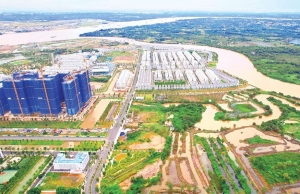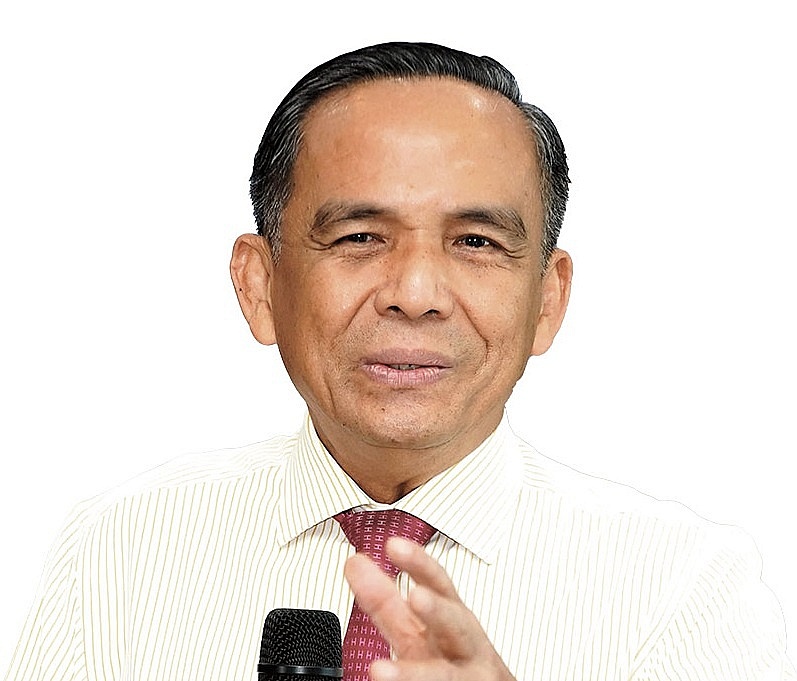New methods for small property investors
Vingroup last week announced the establishment of VMI JSC with the chartered capital of $782.6 million.
VMI JSC was established by Pham Nhat Vuong as the main shareholder, along with other shareholders including Vinhomes, to help allow small-cap investors to invest in real estate, manage real estate, and develop the secondary market to increase liquidity and value for real estate developed by Vinhomes.
The company will invest a certain amount of the existing or future real estate of Vinhomes, then the real estate value is divided into 50 parts, and VMI’s customers can participate in partial investment through a business cooperation contract. Investors cooperating with VMI JSC will be certified by the company and receive a share of profits from this property in proportion to the investment rate.
 |
| Real estate businesses are usually behind fintech apps, and the effectiveness depends on the developers |
Starting small
VMI JSC will offer flexible investment cooperation policies based on the market to maximise investors’ profits. Specifically, the investor will enjoy all the benefits from the increase in the value of the real estate during the investment period and is committed by VMI JSC to the minimum annual profit to ensure that the investor still has a fixed income in the event of adverse market movements. Investment cooperation policies will be publicly announced by VMI JSC on the online real estate information platform.
Phan Thanh Long, general director of VMI JSC, said that the company wanted to take the lead in creating an attractive product for customers with a small amount of capital that still wanted to participate in investing in the real estate market.
“We believe that with Pham Nhat Vuong being the main shareholder, who has extensive experience in real estate investment and strategic cooperation with Vinhomes, the investment properties that VMI JSC participates in will constantly add value, bring sustainable income to investors, and contribute to promoting a more vibrant and transparent secondary market,” Long said.
The operating model of VMI is a form of joint purchase in real estate. Dividing the value of real estate into several parts; each investor can contribute capital from several million to several hundred million VND. Capital contributors will receive investment certificates on application, which can be held until maturity to receive back their capital and interest at the rate of profit that was initially committed. Investors can also transfer their investment certificates to other investors.
Globally, several companies have operated this model, such as Fundrise, DomaCom, CoVESTA, and Property Share. In Vietnam, Houze Invest, Infina, Moonka, and Sunshine Finance are pioneers in this field.
Infina, a platform that provides joint real estate products, such as houses and apartments, recently raised $2 million from a group of investors, including Saison Capital, Venturra Discovery, 500 Startups, and Nextrans. Infina allows a capital contribution to buy real estate from $830-8,300 and committed profits can be from 6 to 9 per cent per year, with commitments to buying back real estate at any time in the first two years.
A member of Infina’s board of directors, who wishes to remain unnamed, said that since 2019, the firm has been developing a joint purchase model of real estate to make investing easier, more convenient, and efficient, especially for those who do not have much capital.
“Young people are now smart and open to technology. They also need to invest and develop their own finances, but it is hard for them to approach investment portfolios in real estate because they require remarkable investment capital. So, this is a good way for them to participate in the real estate market and benefit from the country’s development,” the Infina representative said.
Moonka, another developer, implements joint purchases on cryptographic technology platforms. Each property can be subdivided into 100 or 1,000 parts or more, depending on value or type. It has successfully raised capital for real estate projects in Can Gio (Ho Chi Minh City) and Bao Loc (Lam Dong). Each project has an investment period of about six months with an expected profit of 15-18 per cent, calling for about 20-30 investors.
“If the available capital is $41,500, you may think there are few choices for profitable real estate investment; people with small capital often only choose small or suburban projects. But coming to us, investors can still invest in good products in many different segments with modest capital,” Moonka said.
“Available capital of VND1 billion creates a limit, which can only help investors access the segment of cheap real estate or land plots. Usually, these products do not receive many benefits and are far from the centre. On the other hand, to participate in the mid-range real estate segment, the capital must be doubled or tripled. If the source of funds is borrowed, the investor has to bear interest on the loan or the cost of capital.”
Meanwhile, developer Houze Invest provides real estate investment solutions with a small amount of capital. Recently, this platform received an investment of $2 million from DKRA Group. With Houze Invest, investors will own their investments through the contract signed with the owner of the investment product. They can transfer the investment to those who want to buy it back on the secondary segment of Houze Invest.
Reducing risks
In Vietnam, this method is still quite new. Therefore, in addition to the need for a legal corridor for the model, experts advise on real estate investment, especially on technology platforms, and investors need to pay attention to the law of assets purchased together. In addition, the financial potential of the project investor must be strong to ensure that the enterprise can afford to pay the fixed profit or the minimum profit according to the committed schedule.
“This investment cooperation is not prohibited by law in Vietnam. However, for this model to develop sustainably, the state needs to supplement a legal corridor and specific regulations to bring efficiency, as well as protect the interests of the parties involved,” said Bui Van Tuan, an independent investor. “Investors participating in capital contribution must have the right knowledge to understand the value that this model brings; if not, they will think it is not safe.”
Lawyer Truong Thanh Duc from the Hanoi Law Association said that when participating in this method, investors only risk losing profit if the developer fails in their projects.
“There is currently no mechanism to protect investors’ money, but it completely depends on the status, reputation, ethics, and capacity of the person who organises the game,” Duc said.
Tran Kim Chung, former deputy general director of the Central Institute for Economic Management, said that the essence of this model was like a real estate trust fund. “If it’s run well, it can be super profitable. According to a Bloomberg study, the average interest rate of this model is 13.8 per cent, which is high and stable,” Chung said.
| Le Hoang Chau-Chairman Ho Chi Minh City Real Estate Association
We have just re-evaluated the recently revealed models of raising capital in the form of property division. We found that if legal and technological factors are ensured, this approach can open up a more flexible capital-raising market than before. The asset division model to call for investment in Vietnam should be studied towards the direction of real estate securitisation. The way to do it is to encrypt the value of real estate with blockchain technology and use a token code to conduct capital-raising transactions. This is a new investment model with a similar operating method to Real Estate Investment Trusts (REIT), applying blockchain technology to the real estate sector. This form opens up the world of crypto assets to those with meagre financial resources entering the market. The approach can be considered a complementary and promising alternative to traditional real estate investment methods that have gradually become outdated. In the US, a blockchain tech company named Fluidity and a real estate broker named Bro Pele have created a contract that governs and ensures the truthfulness of both the seller and the buyer of real estate tokens. With blockchain technology, it is possible to ensure transparency, safety, and solve the problem of information between buyers and sellers, thereby promoting liquidity in the real estate market. Besides easier access to customers, investors can sell these tokens to raise funds for project development. Not to mention, the bigger benefit is that the value of this property often increases over time. According to our assessment, instead of having to worry about running up to the deadline to pay the bank loan, when implementing asset encryption in this securitisation method, real estate developers will be able to mobilise large capital from the society through investors to complete their projects. Currently, real estate tokenisation is still in its infancy, so it has not yet opened to the public and had not much impact on financial activities and the real estate market. However, the model will certainly affect the way real estate business and property ownership in the thriving digital age. We will continue to study and propose amendments and supplements to the Law on Securities regarding the securitisation of real estate, investment funds, and REITs to promote this funding model widely in Vietnam. Pham Lam-Founder and CEO Houze Group
Split real estate investment platform Houze Invest, a member of Houze Eco-system, commits to investment profits of up to 12.5 per cent annually. Houze Group also received an investment of $2 million from DKRA Group and other investors. Up to September, Houze Invest successfully mobilised $870,000 for nine subdivided properties. Accordingly, these properties were divided into 21,000 parts, equivalent to ($43) each. Vietnamese people love the real estate investment channel. According to the Vietnam Real Estate Consumer Sentiment 2022 report released by batdongsan.com.vn, 92 per cent of surveyed Vietnamese have plans to buy a property in the future. This is the highest rate in Southeast Asia. Investments in real estate will need a large amount of capital. By dividing this into many shares, investors can participate in real estate investment with a modest and flexible capital, depending on their financial ability and starting from a few million VND. Nevertheless, they can still receive a return and attractive profits of up to 12.5 per cent per year. Houze Invest has many different investment types, meeting the diverse needs and investment styles of the market, such as profit-sharing packages based on the increased efficiency of actual real estate or a combination of other types. Such models have outstanding advantages. Firstly, they can attract a group of customers with modest financial resources to easily participate in the vibrant real estate market. Next, developers can apply technology platforms to this investment, ensuring all information is transparent, public, and easy to access. Lastly, the transaction process and procedures are fast, convenient, and highly liquid when being traded on the platform. Investors can split their investment into many different real estate projects, thus minimising and spreading risks, thereby optimising investment efficiency, creating more opportunities to increase profits, and helping developers to sell their products. Investors also have access to an abundant source of capital. This is a method with prospects in the real estate market of Vietnam and has a tendency to develop positively in the near future. When the legal framework is solid, the technology infrastructure is complete, and the application of fintech flourishes, we believe that this method will take off even more. At that time, all Vietnamese can invest in real estate in a proactive, safe, transparent, and effective manner. |
 | More clarity urged for draft guidelines of new Land Law Although the draft amended Land Law is deemed to meet the requirements for Vietnam’s economic development, it remains unclear whether it can solve practical problems in land acquisition, speculation, and valuation. |
 | The advantages and challenges of joint real estate investment in Vietnam Vietnam’s real estate market outlook remains positive, driven by strong domestic and foreign demand for housing and investment. However, high initial investment value and low liquidity are major barriers preventing individual and institutional investors from participating in large-scale projects with stable cash flow in Vietnam. Therefore, residential real estate is always a sought-after property for individual investors. |
What the stars mean:
★ Poor ★ ★ Promising ★★★ Good ★★★★ Very good ★★★★★ Exceptional
Related Contents
Latest News
More News
- Construction firms poised for growth on public investment and capital market support (February 11, 2026 | 11:38)
- Mitsubishi acquires Thuan An 1 residential development from PDR (February 09, 2026 | 08:00)
- Frasers Property and GELEX Infrastructure propose new joint venture (February 07, 2026 | 15:00)
- Sun Group led consortium selected as investor for new urban area (February 06, 2026 | 15:20)
- Vietnam breaks into Top 10 countries and regions for LEED outside the US (February 05, 2026 | 17:56)
- Fairmont opens first Vietnam property in Hanoi (February 04, 2026 | 16:09)
- Real estate investment trusts pivotal for long-term success (February 02, 2026 | 11:09)
- Dong Nai experiences shifting expectations and new industrial cycle (January 28, 2026 | 09:00)
- An Phat 5 Industrial Park targets ESG-driven investors in Hai Phong (January 26, 2026 | 08:30)
- Decree opens incentives for green urban development (January 24, 2026 | 11:18)



 Tag:
Tag:




















 Mobile Version
Mobile Version